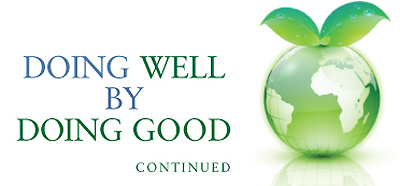

BARRIERS TO SUSTAINABILITY
| “Education can bring much-needed awareness to corporate sustainability and different ways to measure it.” — Joel Harmon, Institute for Sustainable Enterprise |
|---|
The American Mangaement Association (AMA) report, Creating a Sustainable Future: A Global Study of Current Trends and Possibilities, 2007–2017, lists several barriers to sustainable business. It cites such examples as an anti-environmentalism movement, challenges to global warming research, affordability, unawareness of what sustainability is, skepticism among leaders, difficulty in measuring goals and short-term thinking by corporate executives.
Another barrier to sustainability is the notion that such initiatives are an expensive gamble on the corporation’s part. “Managers who are trained to believe that profit is the prime directive of business may find it hard to believe the financial bottom line can improve through social- and environmental-responsibility efforts,” states the report.
Another source of resistance is confusion over what constitutes a sustainable business. According to the AMA study, “Some executives confuse sustainability with one of its parts — corporate social responsibility — and assume their organizations are already up to par because they have done good things for their communities.”
One very strong deterrent to implementing sustainable business practices is the difficulty in measuring sustainability outcomes. This is where organizations like Fairleigh Dickinson University’s Institute for Sustainable Enterprise (ISE) and the AMA become crucial to the future of business and society.
“Education can bring much-needed awareness to corporate sustainability and different ways to measure it,” says Joel Harmon, ISE director of research. For instance, the ISE has developed the Sustainability Pyramid, which details qualities associated with highly successful sustainability strategies (see Figure 1).

Midway as one moves up the pyramid are metrics or the measurement of sustainability efforts. These may include: environmental efficiency, measured through energy audits; carbon footprint analysis; global reporting initiatives undertaken; community/corporate citizenship, commonly known as corporate social responsibility; a corporate atmosphere that is strong on ethics; and a diverse employee population.
CONVERTS TO THE CAUSE?
Harmon notes, “When huge and profoundly influential organizations such as General Electric or Wal-Mart — not generally viewed as very socially responsible firms — make major strategic commitments to social/environmental sustainability, even skeptics start to take notice.”
GE is spending billions of dollars to position itself as a leading innovator in everything from wind power to hybrid engines, and has pledged to cut its greenhouse gas emissions by 2012 to 1 percent of what it was in 2004.
Wal-Mart has made a series of high-profile promises to slash energy use overall, from its stores to its vast trucking fleets; to vastly reduce waste and harmful materials in its entire supply chain; and to purchase more electricity derived from renewable sources. It has even hired renowned environmentalist Amory Lovins to be one of its top strategic advisers and, through the Wal-Mart Foundation, Inc., endowed the Applied Sustainability Center, an interdisciplinary initiative of the Sam M. Walton College of Business at the University of Arkansas, with a gift of $1.5 million. And, most recently, the mega-store chain has pledged to upgrade its employee health care benefits.
Dow Chemical, manufacturer of Styrofoam products, sees a market in the need for low-cost housing and is developing technologies such as eco-friendly foam boards to be used in construction. It also is developing products such as roof tiles that deliver solar power to buildings and water treatment technologies for regions short of clean water.
Opening Page | Profitability | Barriers
Collegiate Commitments
FDU Magazine Home | Table of Contents | FDU Home | Alumni Home | Comments
Globe image this page ©iStockPhoto.com/Julien Grondin.
©Copyright 2008 Fairleigh Dickinson University. All rights reserved.
For a print copy of FDU Magazine, featuring this and other stories, contact Rebecca Maxon, editor, 201-692-7024 or maxon@fdu.edu.